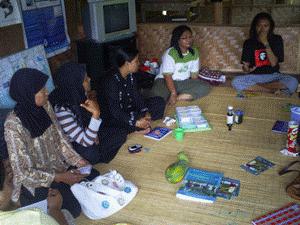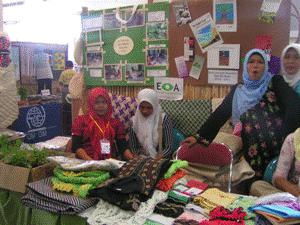Lesley McCulloch
Other projects
13 Jul 2011
Integrating Environmental Justice and Conservation of Natural Resources into Natural Resources Management Policy in the Province of Aceh, Indonesia
This project examines the work of the joint Eye on Aceh/Environment of Asia Environmental Education Program, which is raising awareness of local environmental issues in five areas in Aceh.

The Rufford Foundation’s grant for 2006/2007 is to support the work of the joint Eye on Aceh/Environment of Asia Environmental Education Program, which is raising awareness of local environmental issues in five areas in Aceh – Aceh Besar, Pidie, North Aceh, Lhokseumawe, and East Aceh. Our existing network of 30 women’s business cooperatives and our local staff based in each district have paved the way for EE activities with children and the broader community in villages in these five areas. Part of the EE programme focuses on the existing network of women’s business cooperatives to encourage a more sustainable way of life, ensure that their products are produced in a 100% environmentally-friendly manner and to increase awareness of some of the urgent environmental problems posing a risk to their livelihoods. More broadly, we work with local schools in the villages and other informal networks to bring the issue of sustainable living and protection of the environment to as many people as possible in the 30 villages.

To help facilitate this, EOA is producing and distributing environmental education booklets in Bahasa Indonesia on issues as wide-ranging as waste management, pesticides, organic farming, energy use, deforestation and flooding. This material is being used as a basis to hold environmental education workshops and discussions not only within the women’s groups, but also for the wider community and with EOA staff. All EOA field coordinators and office staff attend monthly EOA staff meetings at which an environmental topic is discussed, e.g. chemical-free cleaning products, waste management, pollution, illegal logging. EOA field coordinators then hold discussion sessions on these topics with member groups. We have recently produced a larger book on forests in Aceh which includes suggested activities to help those conducting the workshops.
All EOA staff receives ongoing training on environmental issues, how to conduct discussions at the local level, and how to use the materials produced by EOA. The EE programme is supervised by our EE coordinator.
Moreover, EOA also plans to write another environmental education book on human-animal conflict using case studies to look at responses to human-wildlife conflict throughout Aceh. The book aims to provide a better understanding of human-wildlife conflicts and offer solutions to proactively address what is becoming an increasingly frequent problem in many parts of Aceh.